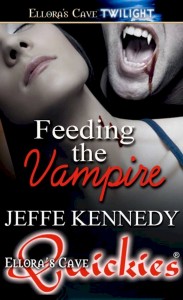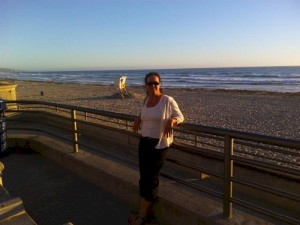 Feeding the Vampire is a quick paranormal romance that is a sensual and tasty treat that is perfect to pass any time of day!
Feeding the Vampire is a quick paranormal romance that is a sensual and tasty treat that is perfect to pass any time of day!
Month: February 2012
Interview!
 New interview with me! (Just in case there’s anything you didn’t already know…)
New interview with me! (Just in case there’s anything you didn’t already know…)
Respecting the Tropes
 I’ve been reading a lot of books lately that I wouldn’t normally pick up.
I’ve been reading a lot of books lately that I wouldn’t normally pick up.
That’s because I’m judging for the Romance Writers of America (RWA) RITA awards. This is the romance genre’s version of the Hugo or the Oscar. Yeah, there might be some out there already snorting in disdain, but for our genre, this is one of the highest awards you can get. The first round is entirely peer-judged. As in, if you want to enter your book for the RITA, then you must judge. Thus, in mid-January, I received eight novels to read by the beginning of March.
We do get to pick categories, but otherwise I am reading books by authors I have never read before. All of them are a bit of a stretch from my normal pleasure reading. We’re asked to judge the book entirely on its quality and not whether or not we enjoy that particular kind of story, which is also a different lens.
It’s been interesting. And I’m over halfway through my pile, amazingly enough.
One of them is a new author discovery for me now. I gave her book a perfect score and look forward to reading more. Another, in a sub-genre I rarely read, I ranked very high. I don’t know that I’ll pick up her books again, for myself, but I could recognize how well she executed her craft.
One book, though written decently, failed as a romance, in my opinion. Oh, she had all the plot points in there. She faithfully followed the tropes, but they continued to feel empty to me. Contrived, even, which romance is so frequently accused of being.
So, here’s where I make a leap into a series of assumptions. I’m theorizing and obviously have no hard data to back up my ideas here.
It’s no secret that the romance genre is making big bucks these days. A fact that seems to seriously annoy all those who consider romance not worthwhile. Latest stats from RWA: $1.36 billion in sales each year, the largest share of the consumer-book market, more than a quarter of all books sold are romance. What writer doesn’t want some of that pie?
More and more, I’m seeing writers of other genres coming over to the romance field, to pump up their sales. Or adding touches of romance, in order to sell it on that shelf. And sure, sometimes this is the work of the publisher or marketing department, trying to slide in under that umbrella.
The thing is, it’s difficult to wield a trope you don’t love. See, a trope is like a cliché or an archetype. They can be powerful devices or cardboard dummies. A good romance embraces the full emotionalism of people coming together, with all the silliness, hearts, flowers, flying cupids, spats, passion, grand gestures and breathless, intimate moments that implies. It’s not easy to write clichés in a new, vivid and heartfelt way. But if a writer doesn’t tap into that deep store of energy that fuels the tropes in our hearts and minds, then all of that becomes cliché in the worst possible sense.
All of us romance readers love to giggle at the tropes. There are great blogs out there that encourage these discussions. We laugh at the impossibly virginal, feisty heroine and the alpha-male hero who also cooks and loves to brush her hair. And yet, when it’s done right, we also sigh in dreamy delight, and follow their story with fervent attention.
Why? Because the author takes the tropes and breathes life into them.
That doesn’t happen if the author, deep-down, doesn’t respect the tropes.
We might poke fun at the tropes like we roll our eyes at our husbands not being able to find anything without us, but if someone else makes out like our husbands are worthless? Oh no no no.
Use the power of the trope, young author.
But beware of taking it lightly.
Letting the Babies Stay Dead
 There’s a long-used term in the writing and publishing world: Kill Your Babies.
There’s a long-used term in the writing and publishing world: Kill Your Babies.
This is, of course, a euphemism for being willing to recognize which parts of your work are, well, self-indulgent tripe that needs to be cut. For some reason, it’s often the bits we’re most emotionally attached to in our work that needs to be deleted. I suspect it has something to do with that very attachment that makes those parts not good enough. We’re too invested in the meaning to ourselves to have perspective on how it contributes to the story.
Regardless, we all learn at some point to kill our babies.
What this means for most of us, though, is that we delete the offending passage or section and paste it into a document we save. We call it “Outtakes” maybe, and we keeps it forever, Precious. No, the baby isn’t dead, it’s just…Sleeping. I’m sure there are some ruthless, emotionally balanced authors out there who really, truly delete and forever nuke their babies. But many of us have them, little shriveled corpses in the basements of our laptops, that – who knows? – could one day be reanimated! The baby could live again!
The other day I re-watched Notting Hill, one of my all-time favorite movies. (I know this is my second reference to a movie rewatch. I have this Cold Virus That Will Not Die, and so I’ve been spending a lot of time reclining on the couch, alas.) At any rate, I love this movie so much, that I own it. This time I noticed there are special features and, basking in the glow of the Notting Hill love, I watched those, too. They included Deleted Scenes.
Hot Damn! MOAR Notting Hill to love!
The thing is? Those deleted scenes really sucked. They deserved to be deleted. I don’t know what went wrong with them, but they weren’t in line with the crispness of the rest of the movie. Whoever made the decision to cut those scenes exercised excellent judgment. Afterwards, I was kind of sorry I’d watched them. They diluted my glow ever so slightly with their badness.
And it made me think of all the babies I’ve been saving, just in case I can reanimate them. I’ve noticed a blog trend lately where writers are posting deleted sections of their novels or manuscripts. Kind of a fun thing – like the deleted scenes in the special features – and everyone is always looking for blog topics. Still, I’m wondering if it’s a good idea. If something isn’t good enough to stay in the story, it probably shouldn’t be read by anyone besides your CPs and your editor – who are likely the ones who told you to get rid of it in the first place.
After all, none of us really wants anyone to know about all those zombie babies in the basement. It might look bad.
I’m thinking mine might deserve a decent burial.
Missives from the Land of No TV
 I’m over at Word Whores today, talking about my most loved and hated TV shows, and why I’m the worst person to talk about it.
I’m over at Word Whores today, talking about my most loved and hated TV shows, and why I’m the worst person to talk about it.
Sand, Sun and the Erotic Story Arc
Not this particular beach, but the one I’ll be visiting in Pensacola, Florida for the Silken Sands Conference March 16-18. I’m so looking forward to this conference, not just for the warm and the beach, but because it’s a small conference packed with a lot of really great people. Two of my favorite editors, Angela James (Carina Press) and Grace Bradley (Ellora’s Cave) will be there, along with Holly Blanck (St. Martin’s) who I’d like to be one of my favorite editors. 😀 There will also be fabulous author friends there and I’m looking forward to hanging with them.
So, I’m working up my presentation in my head. Brewing it up so I can start making some slides. My workshop? The Erotic Story Arc: Not a Contradiction in Terms.
Yeah – you know what I mean.
A lot of people think an erotic story is simply porn and nothing more. And – hey, let’s face it – some can be. Over on Word Whores this week, we’ve been having an interesting debate on action scenes and whether we skim them as readers. The consensus has been that both action scenes and sex scenes suffer by being all stage direction without real story. So, in the erotic story, the sexual interaction takes center stage, but it still must serve to move the character from one place to another. That’s the core of a story: how the characters change.
Often the change in the characters in an erotic story is the simple coming together. They start out strangers and end up together – classic romantic story arc. There’s also the sexual journey, which usually involves some kind of self-discovery. I like the stories about breaking taboos or old beliefs, liberating the characters to embrace more of the world than they did before.
Any that I’m missing? I’m also looking for suggestions, of really well-done erotic stories that were also moving and meaningful.
And, if you want to see my workshop or just come hang at the beach with some fab writing and publishing people, you can still register!
Medium vs. Message
 I love when the fog is in the valley. It seems so metaphorical. Doesn’t hurt that I’m above it all and still have a clear view.
I love when the fog is in the valley. It seems so metaphorical. Doesn’t hurt that I’m above it all and still have a clear view.
I wish.
Last night I watched Practical Magic. For maybe the one-billionth time. Yeah, it’s one of my all-time favorites, for so many reasons. Some of them are definable and some aren’t. I love it for the LOOKS the women exchange, which seem to be impossible to capture in writing. A glance full of meaning in a movie becomes a cliche of crossed arms and raised eyebrows in a book. Sometimes I envy the filmmakers. I can see the scene between my characters play out in my head, but how to describe it so someone else can see it?
One of the great challenges of writing, I suppose.
Ironically, however, if there are two versions of a story, both a book and a movie, it’s rare for anyone to say the movie was better. In most of these cases, the book came first. I think the last time I read a book that came after a movie was back in the late 70s, after the first Star Wars movie (Episode IV, for the purists) came out. I read one of those tie-in books that they generated to keep the story going. I was getting big into sci fi then and loved the movie. SO disappointing. I was bewildered by the liberties taken with the story and characters. The book itself was poorly written. And gross. Seems like a light saber got jabbed in someone’s eyeball with associated flying goop. At any rate, I never read another. This might explain why I never got into fanfic of any kind. Traumatized at an early age.
Still, the point is that both books and movies tell a story, just in different ways. And books – well they pretty much read like books, no matter how the words are displayed. Jonathan Franzen, who I’m starting to think is worried no one will pay attention to his writing if he’s not being an ass waffle (thank you DYAC!), has now famously declared ebooks a threat to society. He also claims that “serious readers” – whoever those people may be – will continue to read on paper because that has a permanence that ebooks lack.
His justification is beyond bizarre. He says he can spill water on a book and it still works, which you can’t do with an ereader. Yeah, but enough water does ruin a paper book and oh, say, setting it on fire kinda ruins that permanence. But this is the kind of nut job you can’t really reason with.
What gets to me with the ensuing conversations is all the people saying things like the author of this article says:
Franzen doesn’t even take into consideration the countless self-published authors who wouldn’t have a chance of seeing their books actualized because of the old guards at the gates of publishing companies. Most of them won’t win a Pulitzer Prize, but they’ve achieved a dream of sharing their stories with the world.
I’d say it’s more to the point that Franzen would think those people shouldn’t be published if the can’t get through the gates. (Not my opinion – speculating on his.) But that’s neither here nor there. People continue to conflate self-publishing with digital publishing. It’s bizarre to me, because this is demonstrably not the case. I can purchase Franzen’s Freedom from Amazon as a hardcover ($14.44 as of this posting), paperback ($10.88), ebook ($9.99) or audiobook ($37.79). If I read it on paper, will my experience be more serious than on my Kindle?
It’s absurd to think so.
As for permanence, if I leave my hardcover or paperback out in the rain, I’d have to buy a new copy. If I leave my Kindle in the rain, I still have my entire library of books backed up in the data cloud. Which is more permanent?
And what about the audiobooks? Are they evil, bad and a threat to society, too? I can’t recall seeing attacks on audiobooks like we’ve seen on ebooks.
It’s all the same hysteria over change. Which is fine. I understand. We all hit a point where we simply can’t adapt to yet more more technology. But don’t dress up your mental inflexibility as wisdom.
And leave my ebooks alone.
The Dreaded Synopsis: More than a Query Tool
 I had to write a synopsis the other day for the new novel I’m shopping around.
I had to write a synopsis the other day for the new novel I’m shopping around.
It will come as no shock to any of you writers out there that I avoided doing it As Long As Possible. In fact, I had a list of ten agents I wanted to query and I managed to send to eight of them without writing a synopsis. (Which shocked one of my CPs, but it’s true.) Part of this was because a couple of them had asked to see the very next thing I wrote. One of them I’d talked to via email just recently, so I just emailed her with a “here it is” note. Another I tweeted, asking her if she wanted to see it, which she did.
Love those easy ones!
Now, I should say that I did have a pitch paragraph for the book, that I included with these messages. My CPs who’d read the book helped me put that together. Then, there were several more agents I’d had previous positive contact with, that I sent more formal queries to. None of those blessed souls, however, required a synopsis for submission.
When I’d knocked out eight queries/submissions, then I hit the big white wall.
You know the one I mean: the empty screen. The blank page taunting you with the certainty that you can never ever condense your long, lovely, intertwined story into a one-page plot summation. The thing I like to say – which ALL the publishing people hate to hear – is, if I could have told the story in one page, I would have.
Yes, I see you people out there, making faces at the screen.
And I know I’m wrong.
I know you need the synopsis and, if I can’t explain what my story is about in a short space, then either there’s a problem with my story or with me. Possibly both.
At any rate, though I knew that a synopsis is a necessary evil, I didn’t really see the light until I read Malle Vallik’s post this morning about all the things Harlequin and Carina use a synopsis for.
I tell you: I have drunk the Koolaid.
I bookmarked this post for the next time I write a synopsis. Or, for rewriting my Middle Princess synopsis, as I’m now seriously considering.
Now, go get you some Koolaid.
